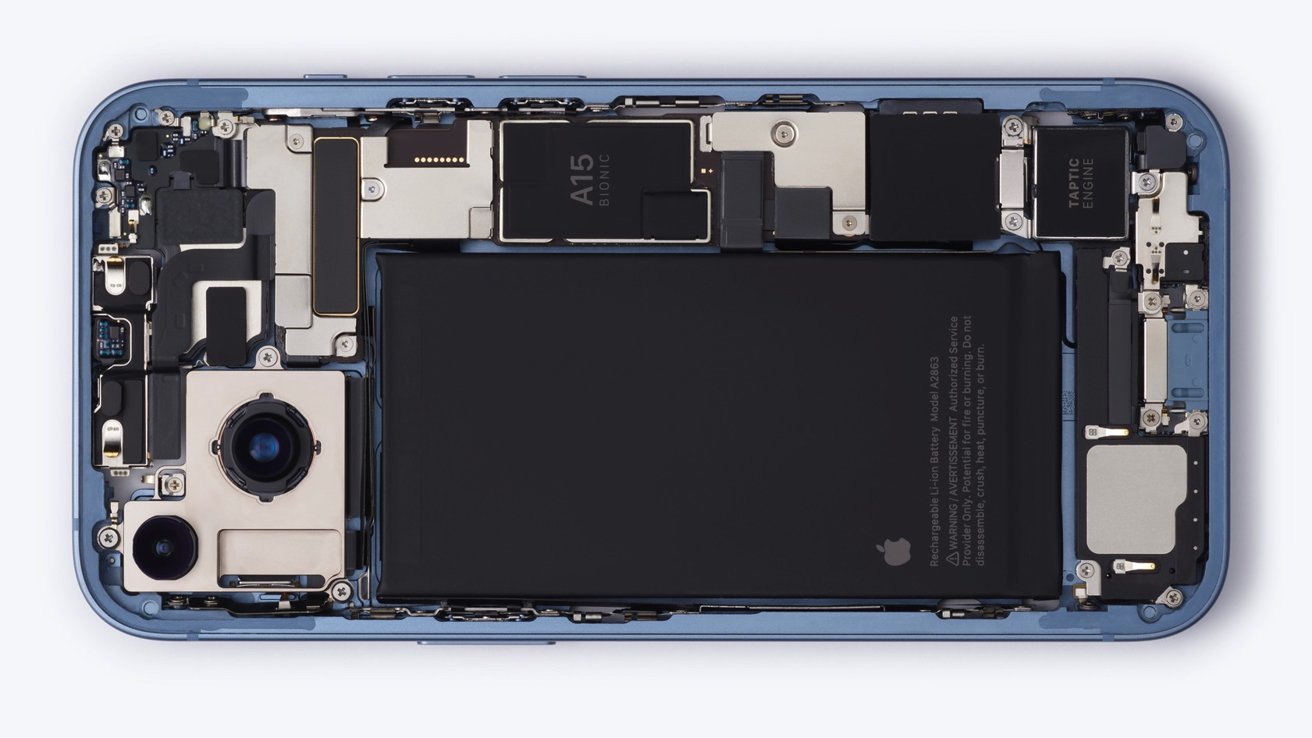Apple aims to reinvent the battery with high-performance cathode technology
A new report claims that Apple is looking at new high-tech battery manufacturing techniques, that could see future devices deliver significantly improved use time and battery endurance.

View of an iPhone battery
Apple famously likes to own the whole stack, from developing the hardware to the software, and that extends to the design of its batteries. While it has to rely on other firms to physically make them -- which has been a problem with the Apple Car -- it is now working on them down to the materials level.
According to ETnews, Apple is developing what it describes as an all-new battery. The performance of the new design comes chiefly from Apple "directly participating in the development of materials that make up batteries."
Apple is said to be pursuing a new composition of raw materials -- nickel, cobalt, manganese, and aluminum -- to make the batteries' cathod materials.
An aim is to "dramatically increase the silicon content." Using silicon instead of today's graphite systems can increase capacity, and also shorten charging times.
However, silicon has traditionally expanded during charging and powering. ETnews presumes that Apple has surmounted this problem, though it offers no details.
"Apple seems to be working hard from the material development stage to boost battery performance," an unspecified source told the publication.
ETnews does also say that Apple is researching the use of carbon nanotunes (CNTs) as a conductive material that could improve battery performance. ETnews does have a
Apple has not commented, but ETnews industry sources say that the expectation is that the company will launch this new form of battery in its devices after 2025. Its these sources that give the publication its good track record for information, though it's less clear how good ETnews is at interpreting Apple's plans.
That's also the year by which Apple has committed to 100% recycled cobalt in its batteries.
Read on AppleInsider

Comments
https://www.pcmag.com/news/toyota-inks-deal-to-mass-produce-solid-state-ev-batteries-with-932-mile
That says an EV will be able to charge in 10 minutes. Even if solid state batteries in consumer electronics had lower capacity, being able to charge so quickly would negate that downside because you could just plug it in anywhere for a couple of minutes to get full capacity or worst-case carry a battery pack and do the same.
With any new technology, there's an issue scaling it. Apple probably has prototypes of really advanced batteries but they need to figure out how to make 250+ million of them per year.
With regards to silicon carbon batteries, both Huawei and Honor are shipping phones with them.
As for fast charging and battery degradation, there is more to it than just those two factors.
From personal experience of having used (and abused) fast charging for many years, none of my phones have required battery upgrades due to battery degradation issues.
Is it really a strategic technology for computers? For cars, most certainly at this point in the EV adoption curve, but computers? Isn't a battery like the 3rd or 4th, or higher, most expensive part of mobile computer?
Display, SoC, cellular modem, then the battery?
"ETnews does also say that Apple is researching the use of carbon nanotunes (CNTs) as a conductive material that could improve battery performance. ETnews does have a
Apple has not commented, but ETnews industry sources say that the expectation is that the company will launch this new form of battery in its devices after 2025."
Does not seem crazy to me at all for Apple to actively pursue this field with great interest and investment.
Why? Future Products and current small devices portfolio.
Vision Pro needs a separate battery via cable at the moment. This is clearly not what they want. Higher capacity, lower weight and fast charging seem core to the pain point at the moment to remove the need to tether a power pack. Remove it and lower the overall weight of the device is critical after the early adopter stage.
AirPods. Can't do a long haul flight on one charge. Would be greatly improved with longer battery life. Longer battery life will also unlock further assisted hearing and med tech use cases. Mission critical to get this done in the medium term to unlock further growth.
Apple Watch - can always use more battery life and may unlock new use cases for on device compute boosts in particular the neural engine for more advanced onboard Siri.
https://bgr.com/tech/these-crazy-thin-batteries-are-the-key-ingredient-in-honors-magic-v2-foldable/